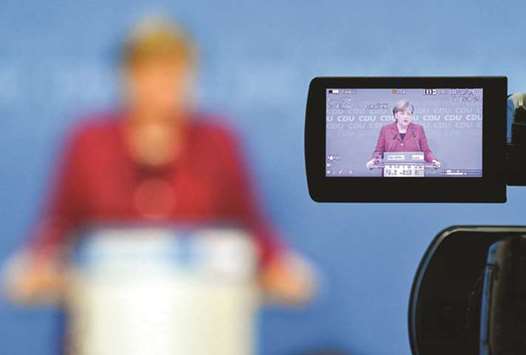German Chancellor Angela Merkel has called for speedy efforts to form a stable new government with the Social Democrats (SPD) and said that her conservative party saw areas of common ground on domestic reform and Europe.
Merkel said renewing the “grand coalition” that ruled Germany for the past four years was a “historic necessity” that would best position Germany to work with France to strengthen the European Union before the next European elections in 2019.
“The world is waiting for us to be able to act,” she told journalists after meeting leaders of her Christian Democrats (CDU) to agree on core demands for negotiations on a new government. “It’s a historic necessity given the external circumstances.”
The conservatives are trying to hammer out a deal with the SPD without conceding too much on policy or spending plans, after failing to strike a deal with two smaller parties.
Conservatives will meet for initial talks with the SPD tomorrow, with SPD leaders to decide on Friday whether to launch formal exploratory talks.
But hopes that cash from Germany’s buoyant economy would make it easier to paper over the parties’ differences diminished yesterday when an official advisory council warned that surpluses were needed to cover future downturns.
The SPD, bruised by its worst-ever post-war election results and anxious to stake out a left-wing social policy profile that differentiates them from conservatives, wants commitments to spend more on education and combat poverty.
But the Stability Council, comprised of representatives of Germany’s federal and regional governments, warned that surpluses were the result of a higher tax take from the booming economy and would decline in a downturn. “The favourable budget situation should be used to make provisions for later years,” the council said.
SPD secretary general Lars Klingbeil told ARD television that his party was open to all possibilities, including a renewed coalition with conservatives or a minority government.
“The ball is now in Mrs Merkel’s court,” Klingbeil said, adding that the pace of negotiations depended to a large extent on demands articulated by the CDU and its Bavarian sister party, the Christian Social Union (CSU).
Merkel sketched out areas of possible agreement on jobs, the economy and healthcare, saying that it was clear to both sides that changes were needed after the September 24 elections, which saw both political blocs lose substantial support.
She said that CDU leaders agreed on the need for a grand coalition as opposed to a minority government, to strengthen the European Union at a time of increasing geopolitical challenges from Russia and China, the United States’ increasing retreat from multilateral institutions, and Middle East conflicts.
She said conservatives supported strengthening ties with France, including work on a joint corporate tax policy by 2025, increased collaboration on digitisation and efforts to harmonise arms export policies.
Senior conservatives on Saturday rejected the vision for a “United States of Europe” put forward by SPD leader Martin Schulz, with many warning the SPD against jeopardising the chances of agreement by making excessive demands.
But Merkel said there was “a lot of common ground” with the SPD on Europe.
A poll published yesterday by broadcaster RTL and n-tv showed 71% of SPD members welcomed the party’s decision to talk with conservatives about forming a new ruling coalition, while 81% wanted the party to conduct tough negotiations.

Merkel appears on a viewer of a camera as she addresses a press conference after a leadership meeting of her CDU party in Berlin.
